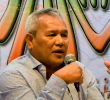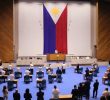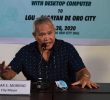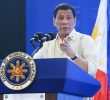DAVAO CITY – He may be the first president from Mindanao, but President Rodrigo Duterte’s last State of the Nation Address was a disappointment for some Mindanao thought leaders.
A Bangsamoro advocate, an academe, and a Lumad lawmaker shared the same criticism that Duterte’s final SONA on Monday, which may well define his legacy, failed to articulate issues such as sustaining the young Bangsamoro Autonomous region, mining and environnment, Lumad displacement and peace talks with the National Democratic Front of the Philippines (NDFP).
Mags Maglana, a member of the civic group Konsensya Dabaw, reviewed Duterte’s last SONA to his first in 2016, and found the old messages of the first did not materialize on July 26.
Silent on federalism
“Federalism, which was among main campaign messages of… Duterte in 2015 and 2016 and which made it to his remarks in SONA 2016 was not part of the key messages of the last address,” she observed.
Duterte’s party, Partido ng Demokratikong Pilipino (PDP) Laban, had pushed for federalism for years, especially by its founding chairperson the late Senator Aquilino ‘Nene’ Pimentel Jr.
The last time pro-federalism groups made a big push was in 2018 through provincial assemblies especially in Mindanao and a consultative committee consisting of jurists and political scientists selected by the president to formulate a draft federalism constitution. Congress did not act on this draft proposal, and was never tackled ever since.
A Pulse Asia survey showed 67% of Filipinos opposed charter change for federalism while 18% were in favor.
Extension for Bangsamoro transition urged
The Ateneo de Davao University (ADDU) released an assessment of Duterte, which says his “greatest legacy” for Mindanao is the signing of Republic Act 11054 or the Bangsamoro Organic Law in July 28, 2018, which led to the establishment of the Bangsamoro Autonomous Region in Muslim Mindanao (BARMM).
It was Duterte’s predecessor, the late Benigno ‘Noynoy’ Aquino III, who paved the way for the peace settlement with the Moro Islamic Liberation Front (MILF) by holding a dialogue with its leaders which created BARMM.
But the Ateneo de Davao statement said there is still a need for President Duterte to call for an extension of the transition period of the Bangsamoro Transition Authority (BTA) until 2025, as the mandated three year transition “was too short, especially with the unprecedented mayhem of the COVID-19 pandemic.”
“Underscoring the utmost importance of securing the Bangsamoro dream to come to fruition and ensure that its long-fought-for self-governance not be weakened by haste and swiftness, the President must urge Congress to extend the BARMM transition period,” the statement said.
“As a Mindanawon president, PRRD should certify as urgent the bills in Congress seeking to amend the Bangsamoro Organic Law, specifically Section 13, Article XVI of RA 11054, extending the transition period to another three (3) years or until 2025,” it added.
The president, however, did not mention this on SONA, upsetting Moro civil society groups who had launched a one-million signature petition urging the bills to extend the transition be made a priority.
Prior to the SONA, Duterte said he will support the extension, but later said he will “remain neutral” and leave this to Congress.
Marawi rehab, where now?
The Marawi crisis was also a major concern that wasn’t highlighted in the SONA.
“He only made a short mention of the Marawi crisis, which his administration instigated by its handling of the situation, by acknowledging that rebuilding is not yet complete,” Maglana noted.
In a report from Mindanao Gold Star, Meranao leader Driza Lingningding of the Moro Consensus Group said he wanted Duterte to apologize for leaving thousands homeless in Marawi. “We’d like to hear the president apologize for failing to protect our city.”
Ateneo said that peace in Mindanao “is not only about resolving armed conflicts. It also requires attention to the recuperation from the fragments of war.”
“Four years since the hostilities ceased, 25,355 displaced families still live in shelters and have not yet returned to their residences in Marawi. Sums of donated money amounting to as much as P3.56 (billion) have yet to be accounted for. People are still coping not only from the trauma of war but more so from the centuries-old narratives of Moro marginalization in Mindanao. The president must articulate a clear path of rehabilitation for Marawi after it was completely destroyed in the 2017 war. This may include the call to pass a sound Marawi Siege Victims Compensation Law,” their statement said.
NDFP peace talks
Ateneo de Davao said that while there are strides in forging peace with the Moro community, parallel efforts must be made to restore peace talks with the NDFP.
Duterte, who once touted himself as the “first leftist president,” scuttled the peace talks after a year and launched an anti-communist task force that has led to closures of Lumad schools, attacks on Lumad and activists through force surrender, trumped up charges and red-tagging all over Mindanao.
“(O)ver time there had been a lot of othering, hating, killing and damning one another for all eternity as the once shimmering goals pale and against the endlessness of it all,” the Ateneo de Davao statement noted. They urge the president not to tire in engaging with peace stakeholders even with the NDFP.
“A genuine legacy of enduring peace in Mindanao necessitates the reopening of the talks and the eventual political settlement of the GRP-NDFP negotiations,” it said.
NTF-ELCAC budget
Bayan Muna Representative Eufemia Cullamat, a Surigao del Sur Manobo who has experienced displacement, chided on the president for pouring P16.4 billion for the counter-insurgency budget.
“Sa sinabi nyang mga lugar na pinaglagakan ng pondo ng bayan para mapaunlad diumano sa pamamagitan ng National Task Force to End Local Communist Armed Conflict (NTF-ELCAC), pagtaas ng bilang ng karahasan at paglabag sa karapatan ang dinanas ng mamamayan (In areas, [he] mentioned where huge portion of the budget are poured in through NTF-ELCAC, rising cases of violence and rights abuses confront the communities),” she said.
Cullamat scored on Duterte for his environment protection and respect for the culture rhetoric.
“Pero patuloy ang sapilitang pagbakwit ng mga katutubo bunga ng mga masaker at militarisasyon sa lupang ninuno (But the perennial forced evacuations in lumad communities persist because of massacres and militarization),” she furthered.
Davao Region has reportedly received a huge chunk of the NTF-ELCAC budget this year, with Duterte’s hometown Davao City receiving P6.4 billion.
Mining
But the biggest concern is on Duterte’s previous anti-mining stand which is now going nowhere.
“He talked of intensifying support against illegal logging and mining in 2016, even trotting out then Department of Environment and Natural Resources (DENR) Secretary Gina Lopez, a known environmental crusader … In his last report to the country about the environment, the president only focused on the state of Manila Bay,” chided Maglana.
Lopez issued a moratorium on large-scale mining, an act that ruffled lawmakers with ties to big mining corporations and rejected her appointment in 2017. Lopez died in 2019 from cancer.
Ateneo de Davao also lamented Duterte’s signing of Executive Order No. 130 last April 14 that lifted the moratorium on mining applications implemented by Lopez.
“To Mindanao, this was a kiss of death to the environment and what remains of its frontiers,” the university said.
The university noted with concern that there is now a “marching order” to operate the Sagittarius Mines Gold Copper Project in Tampakan, South Cotabato within the next two years.
They said Tampakan covers four provincial boundaries (South Cotabato, Sultan Kudarat, Sarangani and Davao del Sur) and headwater of six catchments and two major river systems.
Standing in the way of Sagittarius is the South Cotabato province’s environment code that banned Sagittarius and all open-pit mining operations.
“Disturbing this ban would mean death of the watershed, food insecurity in the region, and injury to the traditions of the B’laans,” the university said.
The university urged the president to revoke EO 130 and instead pursue the Alternative Minerals Management Bill.
Final year
With one more year for the Duterte presidency, Cullamat echoed the sentiments of the anti-SONA protests last Monday.
“Walang nang aasahan ni katiting na pagbabago ang mamamayan sa tiranikong si Duterte. (We don’t expect an ounce of change for the people under the tyrant Duterte),” she said.
Ateneo de Davao hopes Duterte would “heed the calls of the Mindanawons – enduring peace, empowerment of Lumad and environmental protection.”
But there is caution in their final words.
“If these issues fall on deaf ears, it would be a disservice to his Mindanawon identity. If Mindanao is relegated into the peripheries again, then “change is coming” is nothing but a lip service!”










